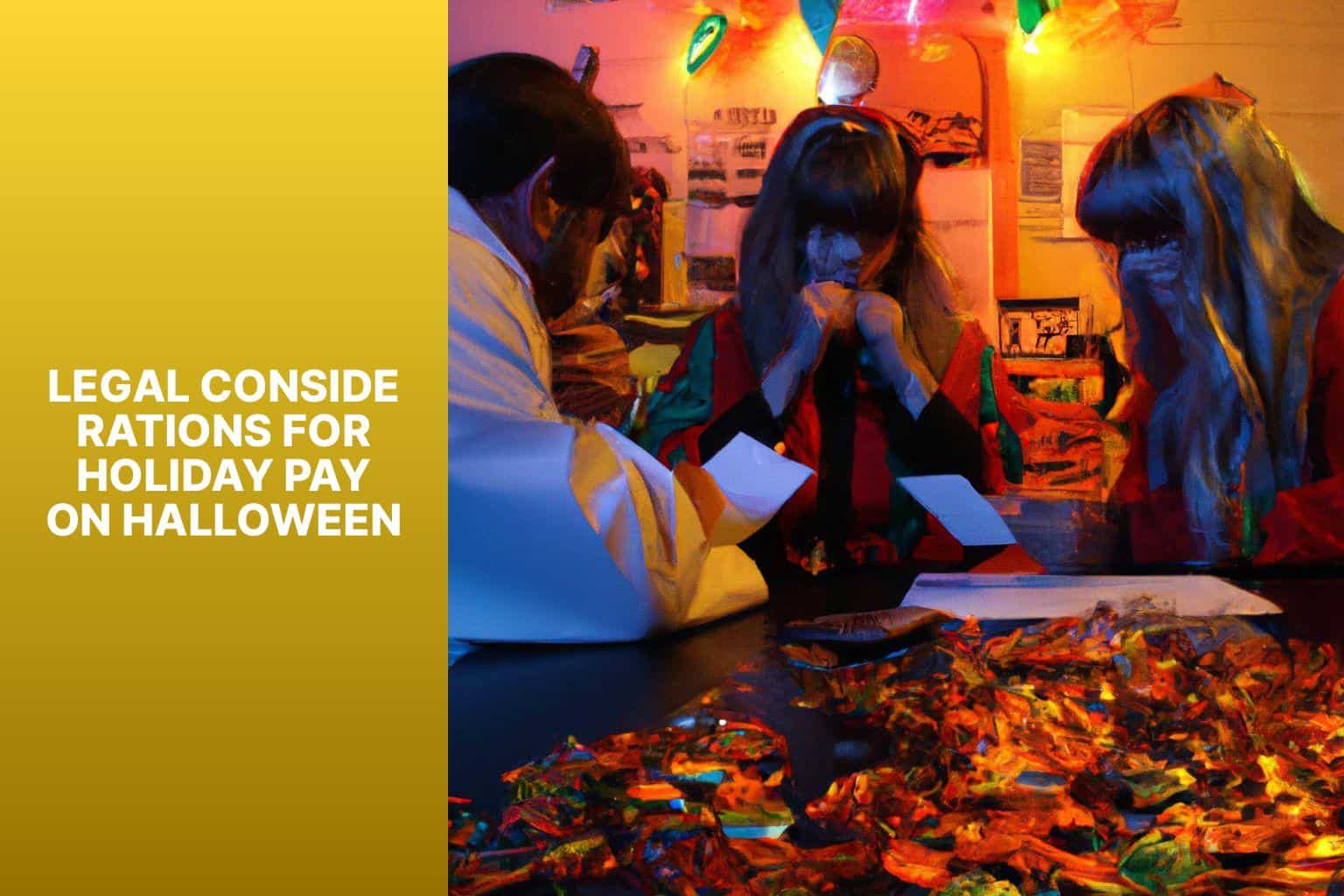Understanding the intricacies of holiday pay is essential for employees and employers alike. This includes determining whether Halloween qualifies for holiday pay. On that note, let’s explore the concept of holiday pay in general.
Holiday pay refers to additional compensation provided to employees for working on designated holidays. It serves as a recognition of their commitment and ensures they are adequately compensated for their time. Eligibility for holiday pay varies depending on factors such as employment status and company policies. Calculating holiday pay involves considering different factors like the employee’s regular rate of pay and any additional bonuses or allowances.
When it comes to Halloween, the question arises as to whether it is considered a designated holiday. To determine this, it is crucial to understand the characteristics that define a day as a designated holiday. one must investigate whether Halloween is recognized as a public holiday by government authorities. The issue arises as to whether employers are obligated to provide holiday pay specifically for Halloween or if it falls under general holiday pay policies.
To delve further into the matter, it is essential to examine the legal considerations surrounding holiday pay on Halloween. This includes a careful analysis of employment contracts and holiday pay policies, as well as any agreements made with unions regarding holiday pay on Halloween.
In some cases, employers may offer alternatives to traditional holiday pay for Halloween. These alternatives can include flexible scheduling, allowing employees to take time off during Halloween festivities without penalty, or providing special event or celebration compensation to acknowledge the holiday’s significance.
By understanding the nuances of holiday pay and considering the specific circumstances surrounding Halloween, employers can make informed decisions regarding compensation for their employees during this festive season.
Key takeaway:
- Halloween might not qualify for holiday pay: While Halloween is a widely celebrated event, it may not be considered a designated holiday for the purpose of receiving holiday pay. Check your employment contracts or company policies to understand if Halloween qualifies.
- Eligibility for holiday pay varies: Not all employees may be eligible for holiday pay. Factors such as employment status, duration, and type of work may determine eligibility. Review your specific circumstances to know if you are entitled to holiday pay on Halloween.
- Alternative compensation options: Instead of holiday pay, employers may offer alternative arrangements such as flexible scheduling or special event compensation for Halloween. Explore these options to ensure you are appropriately compensated for your time during the festive season.
Understanding Holiday Pay
Understanding Holiday Pay is important for employees and employers. Holiday pay is the money employees receive for taking time off on designated holidays. It is a legal requirement in many countries. The amount of holiday pay varies based on factors such as salary and hours worked. In some countries, holiday pay is around 8% of the employee’s regular salary. Employees may also receive additional benefits like overtime pay or double pay on holidays.
Understanding holiday pay is essential for employees to ensure they receive the correct amount and for employers to comply with labor laws. Employers should provide clear information about holiday pay policies, and employees should understand their rights and entitlements. Understanding holiday pay ensures a fair and transparent work environment and helps maintain a positive working relationship between employers and employees.
What is Holiday Pay?
Holiday pay is compensation employees receive for time off on designated holidays. It is an additional payment provided by employers to recognize and compensate employees for working on public holidays or taking time off during these holidays. The amount of holiday pay varies based on factors such as the employee’s regular rate of pay and applicable laws or collective agreements. It is typically calculated as a percentage of the employee’s regular wages, such as 1.5 times their regular pay for working on a public holiday.
“What is Holiday Pay?“
Who is Eligible for Holiday Pay?
Full-time employees and part-time employees may both be eligible for holiday pay, depending on their employment contracts or company policies. The eligibility of contract workers depends on the terms of their contract and arrangements with their clients or employers. Temporary employees may also be eligible for holiday pay if they meet certain criteria, such as the number of hours or days worked within a specific time period. Similarly, seasonal workers may be eligible if they meet their employer’s requirements. Union members might have holiday pay provisions in their union agreements.
In order to determine eligibility for holiday pay, it is important to refer to employment contracts, company policies, and labor laws. Employers should clearly communicate the criteria for receiving holiday pay and ensure consistent application of these criteria. Providing holiday pay serves as a recognition of employees’ dedication and commitment, which contributes to fostering a positive work environment.
How is Holiday Pay Calculated?
When calculating holiday pay, it is important to consider the employee’s regular rate of pay. This refers to their hourly wage or salary. To determine the amount of holiday pay, you need to identify the number of hours the employee would have worked if they had not taken the holiday off.
To calculate the holiday pay, simply multiply the employee’s regular rate of pay by the number of hours they would have worked. This will give you the total base pay for the holiday. It is worth noting that some employers may offer premium pay for working on a holiday. If that is the case, you should add the premium pay amount to the total base pay.
It is essential to understand that different companies or industries may have specific guidelines for calculating holiday pay. For instance, some employers may use a percentage of the employee’s regular rate of pay instead of the actual wage or salary. Employees with irregular schedules or variable pay rates may have different calculation methods.
Having a clear understanding of how holiday pay is calculated ensures fair compensation for employees’ time off and encourages them to take advantage of their benefits.
Is Halloween Considered a Holiday?
Halloween is indeed considered a holiday in many countries, including the United States. It is observed on October 31st each year.
While it may not be classified as a federal holiday in the U.S., it is widely celebrated with various traditions such as costume parties, trick-or-treating, and visits to haunted houses. Halloween has its roots in ancient Celtic festivals and has also been influenced by Christian traditions.
Speaking in terms of holiday classification, Halloween is not officially recognized as a national or public holiday in the U.S. Consequently, businesses and schools do not typically close on this day. Many individuals choose to take time off from work or school in order to engage in Halloween activities and celebrate with their loved ones.
Despite not having an official holiday status, Halloween is widely acknowledged and celebrated by people of all age groups. It has evolved into a culturally significant event that generates substantial economic activity, encompassing the sale of costumes and decorations, as well as the hosting of themed events and parties.
As a matter of fact, according to the National Retail Federation, Americans spent a staggering $8.8 billion on Halloween-related items in 2020, which includes costumes, candy, and decorations. This impressive figure underscores the significant economic impact and the widespread popularity of Halloween among consumers.
What Makes a Day a Designated Holiday?
A designated holiday is an officially recognized day of celebration or significance. It is different from regular working days and has specific legal and cultural traditions. What makes a day a designated holiday?
To be a designated holiday, certain criteria must be met. The day must be widely observed or recognized by a significant portion of the population. This can be based on historical, cultural, or religious reasons. For example, Christmas and New Year’s Day are widely observed holidays due to their religious and cultural significance.
A designated holiday is established through legal means, such as legislation or government declaration. The government or relevant authorities determine which days are designated holidays and communicate this information to the public.
Designated holidays usually come with specific rights and entitlements, such as holiday pay or time off work. These benefits ensure that individuals have the opportunity to celebrate and participate in activities related to the holiday.
Is Halloween Recognized as a Public Holiday?
Halloween is not a public holiday. Public holidays are recognized and observed by the government, usually with special rights or benefits for workers. Although Halloween is widely celebrated culturally, it does not meet the criteria for a public holiday.
To be recognized as a public holiday, Halloween must meet specific requirements. These requirements may include historical, religious, or cultural significance, along with legal recognition by the government. Public holidays often give workers time off or additional pay.
Although Halloween is not a public holiday, some employers may offer special perks or benefits to their employees on this day. These can include flexible scheduling, time off, or special event compensation.
Whether or not employees receive holiday pay on Halloween depends on their company’s policies and employment contracts. Some employers may provide holiday pay as part of their benefits package or as a gesture of goodwill. There is no legal requirement for employers to provide holiday pay specifically for Halloween.
Do Employers Have to Provide Holiday Pay for Halloween?
Do employers have to provide holiday pay for Halloween? Employers are not required to provide holiday pay for Halloween. The provision of holiday pay is determined by employment contracts and company policies. If an employer has a policy designating Halloween as a paid holiday, they must adhere to it. If there is no such policy, employers have the discretion to decide whether or not to provide holiday pay.
Employees should consult their contracts or employee handbooks to determine their organization’s holiday pay policies. Union agreements may also require holiday pay for Halloween, so union members should review their collective bargaining agreements.
If employers do not offer holiday pay for Halloween, alternatives such as flexible scheduling and time off options can be provided. This allows employees to take time off or adjust their work hours for Halloween festivities. Employers may also choose to offer special event or celebration compensation, such as bonuses or incentives, for employees working on Halloween.
Ultimately, whether employers provide holiday pay for Halloween is at their discretion and depends on their policies and agreements. Employees should familiarize themselves with their organization’s policies to understand their entitlements regarding holiday pay for Halloween.
Legal Considerations for Holiday Pay on Halloween

Photo Credits: Rickyshalloween.Com by Gregory Garcia
Exploring the legal side of Halloween pay, we dive into the intriguing realm of employment contracts, holiday pay policies, and union agreements. Discover how these factors influence the lucrative realm of Halloween pay and the potential implications they hold for both employers and employees. Unravel the legal considerations surrounding Halloween holiday pay and gain insights into how this spooky holiday intersects with labor regulations. Get ready for a journey into the legal intricacies that lurk beneath the surface of Halloween festivities.
Employment Contracts and Holiday Pay Policies
Employment contracts and holiday pay policies play a crucial role in ensuring fair compensation for employees during holidays, including Halloween. These legally binding agreements and policies establish the terms and conditions for holiday pay, guaranteeing fair treatment and compliance with legal requirements.
Within employment contracts, provisions for holiday pay are typically included to determine whether employees are entitled to additional compensation for working on holidays or if they are granted paid time off. These contracts serve as the foundation for calculating holiday pay, including any premium rates. It is important for both employers and employees to thoroughly review and comprehend these contracts to prevent misunderstandings or conflicts.
Holiday pay policies, on the other hand, provide a set of guidelines for both requesting and approving holiday pay. These policies outline the eligibility criteria, such as length of service or employment type, and address scheduling conflicts or the process of requesting time off during holidays.
Adherence to employment contracts and holiday pay policies is essential for both employers and employees. Employers must fulfill their obligations outlined in these agreements, while employees should familiarize themselves with their entitlements and rights concerning holiday pay.
A notable fact from the Society for Human Resource Management’s study reveals that approximately 97% of organizations have implemented a vacation or holiday pay policy to compensate employees for holidays like Halloween.
Union Agreements and Halloween Holiday Pay
Union agreements play a crucial role in determining holiday pay for Halloween. Within their collective bargaining agreements, labor unions negotiate provisions specifically related to holiday pay. These agreements clearly outline the rights and benefits granted to unionized workers, including their entitlement to receive holiday pay during Halloween. It’s important to note that the terms of these agreements may differ across various unions and industries.
One of the main aspects covered by union agreements is the rate of pay for workers on Halloween, which often exceeds their regular hourly wage. This higher pay rate is commonly referred to as “premium pay.” Some agreements may offer additional benefits or compensatory time off to employees who are required to work on holidays.
If you are an employee covered by a union agreement, it is essential to carefully review your specific collective bargaining agreement to fully understand your entitlement to holiday pay during Halloween. The agreement will provide details on the conditions and procedures for receiving holiday pay, as well as any limitations or exceptions that may apply.
Here’s a pro-tip: If you are a member of a labor union, it is highly recommended that you familiarize yourself with the provisions related to holiday pay outlined in your collective bargaining agreement. Having a thorough understanding of your rights and benefits ensures that you receive fair compensation for your work on holidays such as Halloween.
Alternatives to Holiday Pay for Halloween
Looking for alternatives to holiday pay for Halloween? Look no further! We’ve got you covered with two exciting sub-sections: flexible scheduling and time off, and special event or celebration compensation. So whether you’re looking for a more flexible way to enjoy the festivities or want to explore different avenues for compensation, these options will have you covered. Let’s dive in and discover the creative ways to make the most out of Halloween without relying on traditional holiday pay.
Flexible Scheduling and Time Off
Flexible scheduling and time off are important options for Halloween and holiday pay.
– Employers can offer flexible scheduling options for employees during the Halloween season, allowing them to adjust their work hours and participate in Halloween activities or events.
– Employers can also provide employees with the opportunity to request time off during Halloween, enabling them to fully enjoy the holiday and spend time with family and friends.
– It is important for employers to establish guidelines for employees who wish to avail of flexible scheduling or request time off. These guidelines may include giving advance notice, managing scheduling conflicts, or setting limitations on the number of employees allowed to be off at the same time.
– By offering flexible scheduling and time off options, employers can significantly boost employee morale and enhance job satisfaction. This approach allows employees to effectively balance work and personal life, promoting a healthy work-life balance.
To ensure a fair and streamlined process for all employees, employers should effectively communicate policies and guidelines regarding flexible scheduling and time off for Halloween.
Special Event or Celebration Compensation
When it comes to special events or celebrations, employers can provide special event or celebration compensation instead of holiday pay. This special event or celebration compensation can take different forms:
- Bonus pay: Employers can give employees a one-time bonus as recognition for working during the special event or celebration. The amount of the bonus can vary based on company policies and budgets.
- Overtime pay: If employees have to work longer hours during the special event or celebration, employers may provide overtime pay. This involves paying employees a higher hourly rate for any hours worked beyond their regular schedule.
- Incentives or rewards: Employers can offer incentives or rewards like gift cards, vouchers, or small gifts to show appreciation for employees who work during the special event or celebration.
- Paid time off: Alternatively, employers may allow employees to take paid time off on a different day if they work during the special event or celebration. This gives employees flexibility to celebrate the event on a more convenient day.
The specific method of special event or celebration compensation will depend on each employer’s policies and practices. Employers should clearly communicate their compensation plans to employees and ensure compliance with legal requirements.
Frequently Asked Questions
Does Halloween get holiday pay?
According to the Fair Labor Standards Act, Halloween is not considered a federal holiday. Therefore, private sector employers are not required to offer holiday pay specifically for Halloween.
Do small business owners have to provide holiday pay on Halloween?
No, small business owners are not obligated to provide holiday pay on Halloween or any other federal holiday. The decision to offer holiday pay is at the discretion of the employer or company policy.
Are private employers required to give holiday pay on Halloween?
No, private employers are not legally obligated to provide holiday pay on Halloween or any other federal holiday. The decision to offer holiday pay is up to the employer’s discretion or may be outlined in company policy.
What are the entitlements to holidays on Halloween?
Entitlement to holidays, including Halloween, may vary depending on state laws and company policies. The Fair Labor Standards Act does not mandate holiday pay, so it is important to check with your employer or consult the company’s human resources department to determine if you are entitled to holiday pay or other benefits on Halloween.
Will I receive normal pay for working on Halloween?
Whether or not you receive normal pay for working on Halloween depends on your employer’s policies. Private sector employers are not required to provide additional pay for working on federal holidays. Some employers may offer incentives or rewards for working on holidays, so it is best to confirm with your employer or refer to your employee manual for specific details.
Can I be compelled to work on Halloween as a federal employee?
As a federal employee, you may be asked to work on Halloween or any other federal holiday. Federal employers have the option to designate holidays, such as Halloween, as normal work hours. While employers are not obligated to provide holiday pay, some organizations may offer incentives or rewards for working on holidays. It is advisable to check with your employer for their specific policies regarding working on Halloween or other holidays.










